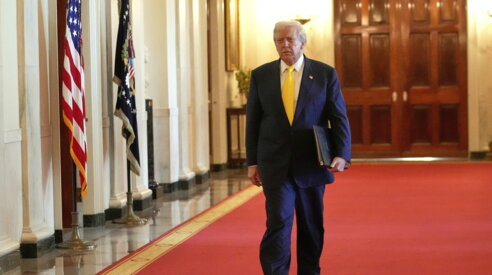The show of Trump's European followers in their underwear in the face of Trumpism


(AP photo)
The director's editorial
Tariffs and more. Trump is starting to lose followers in Europe, and his madness is pushing sovereignists to defend what they've always detested (the market) and fight what they've always loved (protectionism). Popcorn for everyone.
On the same topic:
Politics, especially these days, isn't always able to offer voters and observers spectacles worthy of the name—spectacles worthy of being watched not as if they were a horror film, but as if they were a show to be followed with passion, interest, even enjoyment, with a bag of popcorn to munch on. In the bleak landscape of global politics, where chaos becomes the norm, where disorder becomes law, where madness becomes strategy, there is one spectacle worth paying the ticket for. A spectacle, in other words, to be watched with a good supply of popcorn. And that spectacle is the one currently being broadcast on Europe's best television screens, and particularly in Italy, where the old sovereignists, the old nationalists, the old populists, the old Trumpians, faced with a mirror called Trump, suddenly felt as the legendary Dorian Gray would have felt if Oscar Wilde's portrait had worked backwards. The Picture of Dorian Gray, you may recall, allowed the protagonist of Wilde's novel to never age: instead of his body, the painting aged. With Trump , however, for Trump supporters, it works the other way around: Donald's portrait doesn't age; what ages are all the Trump supporters who look at it, and above all, their ideas. Trump, as in an Oscar Wilde novel, has become an absolute nightmare for all Trump followers who had bet on the American president's rise to finally assert their ideas . So far, in Europe at least, exactly the opposite has happened, and faced with Donald's battles, European political leaders, especially the Italian ones, Meloni aside, have gradually had to grapple with a difficult-to-accept, uncomfortable, some might say, reality: a true sovereignist, in order to defend his country's sovereignty, must fight everything he once considered his duty to defend. Try putting yourself in a sovereignist's shoes today. Try admitting today that to defend the Italian economy, we shouldn't fuel protectionism: we must fight it. Try admitting today that to defend Italian businesses, we shouldn't destroy Europe: we must protect it.
Try admitting today that globalization is not an evil to be demonized, but rather the only resource left to those who share Trump's goals to avoid being hit by the fury of his tariffs. Try admitting today that European elites, in the fight against the perverse effects of protectionism, are not an obstacle to be circumvented, but an ally to be protected, transforming Europe into a useful asset for protecting the interests of member states. Try admitting today that isolationism, taken to its extreme, weakens democratic countries and does not restore their sovereignty. Try admitting that to achieve greater sovereignty, including in the military sphere, and to avoid excessive dependence on other countries, and thus to be freer to exercise our democratic prerogatives, we must abandon pacifist populism and agree to spend more in a sector—defense—demonstrated for years by populists of both the right and the left. You try being former sovereignists, enemies of the market, and having to recognize that it is thanks to the power of the market that populism sometimes causes less damage than it could if left to its fate. And finally, try being a sovereignist, having been familiar with Putin's culture, having been a fan of Trumpism, and having to recognize now that the rise of Putinism and Trumpism at Europe's borders could put Italy in the position of having to deal with an increase in landings from Libya. You try, today, being populists and having to defend everything you have always fought against. And having to recognize that the nationalism of one harms the nationalism of others (as even the AfD—the AfD, that is—was forced to do a few days ago when, realizing that its voters are suffering from Trump's tariffs, it went so far as to condemn its beloved Trump for the tariffs against Germany). And try again to admit that everything you once described as the virus was actually nothing more than a vaccine. Trump's tariffs, we know, have produced, through their mere announcement, a destabilizing effect, distrust, uncertainty, difficulties in the business world, and embarrassment in the political world. Perhaps it will be understood that the wait for the tariffs, in the long run, has been more harmful than the tariffs themselves (the markets, you see, simply don't believe in the idea that the tariffs will destroy Europe, for example). But among the negative elements, almost all of them, there is a positive one, when it comes to tariffs and Trumpism: the momentary immersion in reality of Trump's populist friends, who, watching their idol in America commit madness, see their own ideas suddenly erode like a formidable Dorian Gray in reverse, suddenly finding himself aging faster than his portrait. Trump has many shortcomings, but he does have one merit: he has shown the sovereignists that to defend their country's sovereignty, one must fight everything the sovereignists have always defended and defend everything they have always attacked. For once, popcorn for everyone, and let's keep our fingers crossed.
More on these topics:
ilmanifesto





